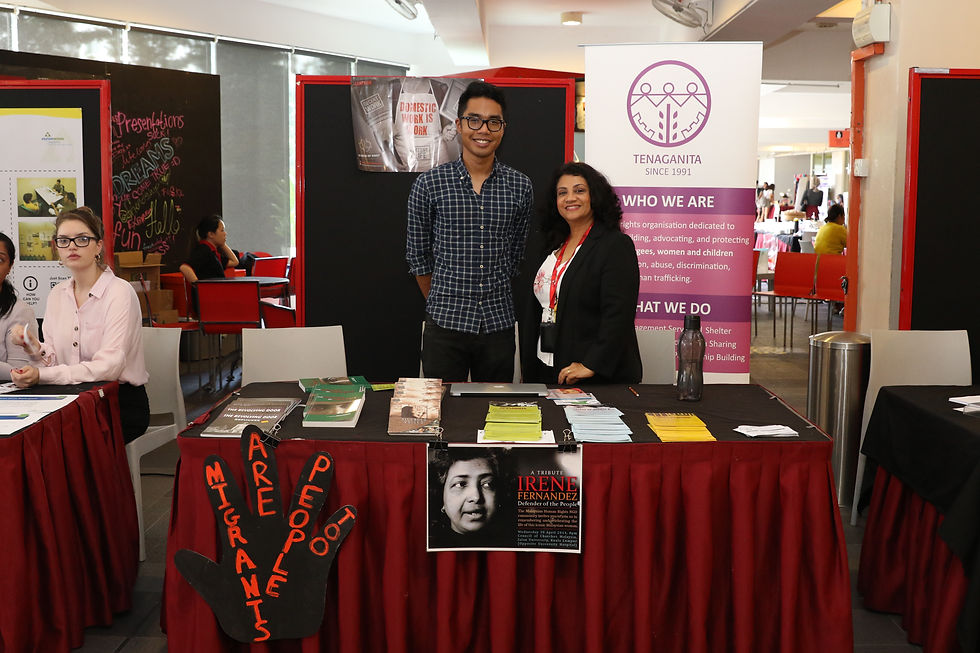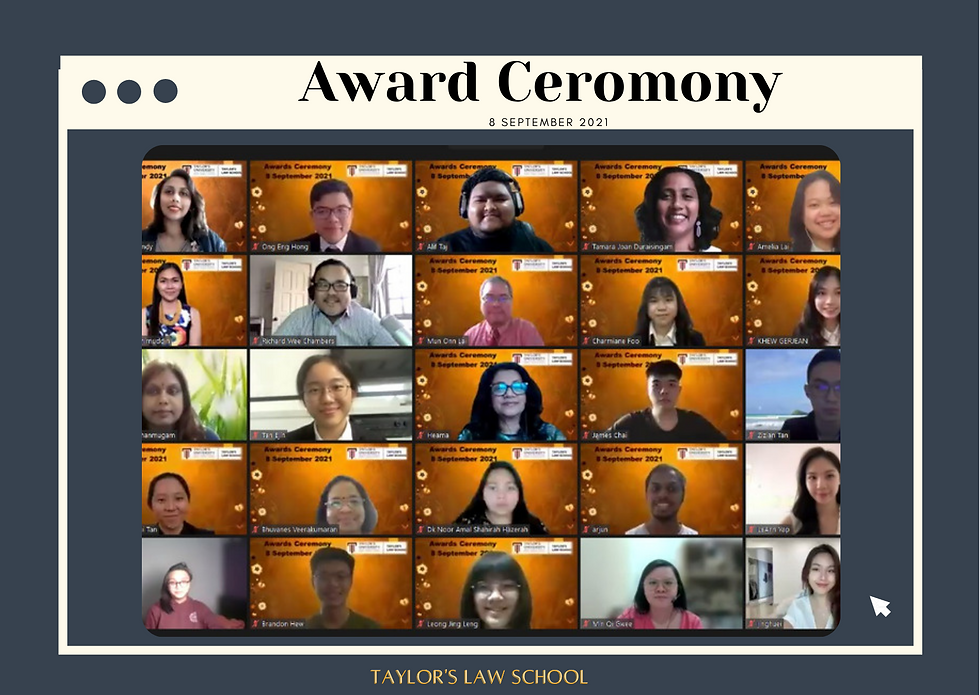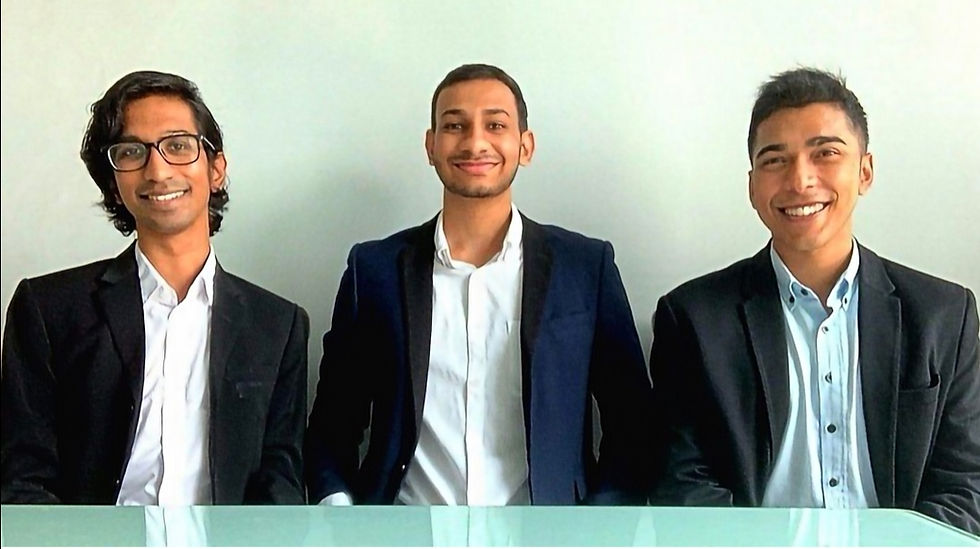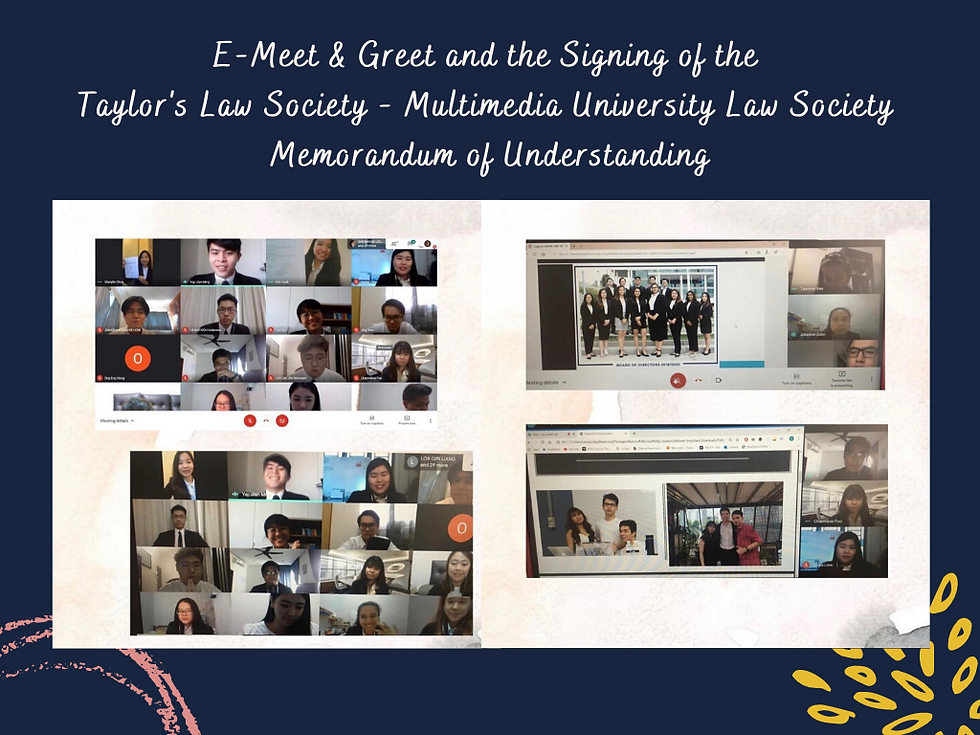Shifting Perspectives (Part 2)
- Lexicon Editorial Board

- Jan 2, 2020
- 10 min read
Updated: May 2, 2020
By Cynthia Silva and Megan Choong
Same Skies
The following interview was conducted between a Lexicon subeditor and a representative of Same Skies, a charitable non-governmental organisation.
1. When was your organisation founded and by whom?
Same Skies was founded in 2014, while the co-founders were working on Nauru. Nauru hosts one of Australia’s offshore detention centres, where refugees who hoped to seek asylum in Australia used to be sent. While working there, the co-founders realised that they all struggled with the top-down approaches in refugee work and services. The first projects supported by Same Skies were Refugee Learning Nest (www.refugeelearningnest.com) and Refugee Learning Center (www.refugeelearningcenter.com). We assisted the teams to hold community consultations, and co-designed fitting solutions to the most pressing of these issues. We then provided some seed-funding, as well as training on management and teaching-related topics to strengthen the capacities of the team. Today, the centres are independently managed and funded, and altogether provide education to over 300 refugee children. Same Skies still provides monthly online mentoring sessions for all team members involved to ensure sustainability and access to advice where needed.
2. What is the core purpose of your organisation and how do you work to achieve it/them?
Same Skies’ mission is to promote global citizenship through collaborative leadership, with which we contribute to a peacefully and ethically shared world. Over the past five years, we have developed and tested our “Refugee-Led Action” approach, which emphasises on strength, resilience, and access to human rights. Our approach has proven that involving community members in all steps of the design, implementation and evaluation of activities addressing the needs of the larger community leads to much more efficient and effective solutions. Refugee-Led Action acknowledges the existing strengths, skills, experiences, and expertise present in displaced communities, and encourages them to take ownership of their own projects, allowing for meaningful engagement and adding purpose to their lives within their host countries. Same Skies focuses on co-designing refugee-led solutions, and provides ongoing training, coaching and mentoring of refugee leaders and volunteers to strengthen their capabilities in managing and implementing these solutions efficiently.
3. What are some difficulties faced by your organisation in achieving your goals?
The two countries in which we currently operate, Indonesia and Malaysia, are not signatories to the 1951 United Nations’ Convention relating to the status of refugees and its Protocols. This means that there is no way for refugees to formally seek asylum through the host governments, and that they are not allowed to work or pursue education, their official status being no different than that of illegal migrants. Governments in these countries could do more to support non-profit organisations by removing bureaucratic obstacles and communicating more frequently and openly. In addition, there is a lack of understanding in host communities about what it means to be a ‘refugee’, and this term, if it is known at all, often carries negative associations. This not only makes it difficult for refugees to connect to local host communities, but also has an effect on organisations such as ours to feel supported in the work we carry out. Lastly, we feel that there is a high level of competition between NGOs, especially when it comes to funding. We would like to see more collaboration between the private and humanitarian sectors, because we believe we can exchange knowledge and resources to increase the positive impact. We contribute to this by partnering with like-minded individuals and organisations.
4. On a personal level, what is the most fulfilling thing about working in your organisation?
I strongly believe that we have to take better care of each other and the planet, and one way to do that is through offering support to strengthen the people around us, and encouraging them to take charge of the impact they wish to have. It is especially motivating to see the effect this has on people, and especially for refugees, whose ideas and experiences are often considered irrelevant. Same Skies works with refugees from all backgrounds, for example: Afghanistan, Sudan, Somalia, Myanmar, Iraq, Syria, Yemen, and Iran. I very much enjoy the partnerships we have built with each of the team members, and learning more about their experiences and ideas every time we meet. I feel very lucky to have found an organisation that fits so well with what I believe in and stand for, and for having the opportunity to explore what I am able to contribute.
5. Do you have any words of encouragement for the students of Taylor’s University or any information to dissipate regarding an opportunity to volunteer, take part in or support your organisation’s upcoming events?
Firstly, students can get involved in local community organisations that involve refugees, for example at the Refugee Network Center in Ampang (https://www.facebook.com/RNCMalaysia/). The more personal contact local Malaysians have with minority groups, the greater the national social cohesion will be as a result.
However, we believe that we need to move away from the trend of “voluntourism”, where people contribute to a project or organisation for a short period of time. Too often, we see that people do not realise that this short-term high impact involvement can also cause harm to the community they’re hoping to support. One way we can allow people to learn and practice creating a positive impact while displaying socially responsible leadership is through our Transformative Leadership in Action programme. In this seven-month action-based learning programme, participants study online and co-create a refugee-led project to put new knowledge into practice. Each cohort includes seven refugees who take on a long-term responsibility over the management of the project. If you’re interested, you can find more information on the programme here: www.sameskies.org/leadership.

Tenaganita
The following interview was conducted between a Lexicon subeditor and a representative of Tenaganita, a charitable non-governmental organisation.
1. When was your organisation founded and by whom?
Tenaganita was founded in 1991 from the struggles of women workers in the plantation and industrial sectors. We were encouraged to found an organization based on the struggles of women who were fighting for their rights as workers, and also to stop violence against women. We had to be creative in our strategies while we were trying to develop and implement some of the programs, because we couldn’t go to companies and simply say, “Hey, we want to teach your workers about their rights so that they can be stronger and more assertive.” So, we conducted various English classes, cooking classes and other skill-based classes whilst incorporating human rights education into the framework. Through that process, we were able to organise almost 93,000 women into unions and associations even back in 1991. I also want to emphasise that the organization was co-founded by the late Dato’ Irene Fernandez.
It started off as a women’s organization (if you look at our name, Tenaganita is basically “Tenaga Wanita” shortened into one word), and if you look at the logo itself, the leaves symbolise the plantations, and the building in the shape of a woman to symbolises the industrial sector’s involvement of women. But with the influx of migrant workers in the 1990s, and we were also approached by a number of refugees and asylum seekers from Burma, Vietnam and Sri Lanka, we started to expand our work to include migrants and refugees.
2. What are the core purposes of your organisation and how do you work to achieve them?
Our organization’s vision is for a just, free & democratic society where all are equal human beings with dignity and rights. It may take forever for us to attain this vision, but our mission is to promote and protect the rights of all women, migrants, refugees and children while creating a space with them for them to achieve their full potential in this world. It’s not only about protecting their rights; it’s also about working together with them whilst giving them the space to reach their own potentials via the provision of education as well as opportunities for them to expand their skills and capacities so that they may also become self-sustained.
One of our core strategies to attain these goals is through case management, where we attempt to rehabilitate, shelter and care for those who come to us for aid. We have a number of hotlines and we work spread awareness to the government, general public, schools, international organisations, and organisations in source countries – that is, countries where refugees and asylum seekers come from. Our numbers are disseminated, and in the event where refugees and asylum seekers have been abused or exploited, they approach us for help. Sometimes neighbours, organisations or even the police approach us to obtain our assistance and intervention on behalf of these people.
We also work with the Bar Council to provide legal support for them.
Currently, we have a number of ongoing campaigns: one of which is our attempt to establish the recognition of domestic work as work – that is, giving a title and identity to domestic workers under the eyes of the law. Secondly, we strive towards upholding the right to work for refugees. Thirdly, we push towards the goal of having the country develop a national comprehensive policy for migrant neighbours, since we currently do not have such a policy in place. Fourthly, we advocate for the abolishment of mandatory whipping and caning for undocumented migrant workers and refugees under the law. Another strategy would also be information sharing on different levels of communication: that is, through training, meetings, and our members’ direct involvement as resource persons for migration.
Finally, we build partnerships with the academia world as well as some corporate companies in order to develop policies for an increased acceptance of migrant workers. We also build shelters for abused migrants, women and children.
We have also stopped many child marriages, especially when it comes to Rohingya brides. We have even sheltered many of them. We obtain news from the communities that a child is going to get married and have stopped said marriages, but this occurs more frequently in the Rohingya communities. Child brides are sent through traffickers (who may also be their family members, mind you) for safety reasons – the parents’ understanding is that their daughters’ lives would be so much better if they were in another country, married to a man, instead of carrying on in the state in which they currently live.
To help these child brides, we cooperate closely with the communities involved in order to track the activities of these syndicates and work with the authorities to arrest those responsible. The issue lies where the girls, who have been taught to accept child marriage as an acceptable norm, may not trust us as easily. Even with the implementation of laws against child marriages (which can help educated Malaysians), migrant communities may still stick to their belief that child marriages are still acceptable and thus, the key to solving this problem lies in awareness.
As of now, we have expanded our work over the years to accommodate for the needs of different communities, especially the communities which are in the under classes: predominantly, migrants, refugees, children and women overall. Now, we have conceptualized it into four key focus areas: migrant rights’ protection, the refugee action program, anti-trafficking of persons, and lastly, business accountability and responsibility.
3. What are some difficulties faced by your organisation in achieving your goals?
One of the main challenges is that the government has not, in the past and at present, given much emphasis on the issue of migration – that is, the full implementation of current laws which protect the rights of migrant workers.
There is also no political will to address these issues when it comes to affected communities. There are many pending issues which we need to look into, i.e. racial discrimination, religious issues and current local issues which take precedence over the issue of migrant workers.
Another difficulty lies in funding. Not many people are keen to give donations for trafficked victims and refugees – most would rather give financial aid to orphanages or old folks’ homes in Malaysia.
The third challenge lies in the public’s perspective. There is a misconception of how migrant refugees are taking over the locals’ job opportunities. However, do we really look at scientific data to back this notion up? The numbers are actually relatively small with regards to the comparison between the amount of jobs migrant workers have as compared to that of locals. We need to break this perception and create the right point of view.
4. On a personal level, what is the most fulfilling thing about working in your organisation?
The most fulfilling thing about working here, especially after working with the late Dato’ Irene Fernandez before her passing in 2014 for 14 years and taking on the leadership of the organization afterwards, is that my inner strength comes from the community that I work with. They are my best teachers and mentors in understanding the reality of the people. They’ve given me the opportunity to work alongside them in developing these communities to become more assertive in upholding their rights. We become a mere supporting role for these people. What I’m beginning to understand is that now, these communities are beginning to speak for themselves.
5. Is there anything you’d like to convey to the law students of Taylor’s University?
As I tell many of our young lawyers who are doing their legal aid work here, you play such an integral and vital role in advocating for the rights of the marginalized: people who are in a vulnerable position who are being exploited. Therefore, I believe that you can take this role and make it your personal calling to bring about changes in one person’s rights.
I also hope that someday, some of you might have the opportunity to sit in a committee to draft, amend or reform legislations which incorporates elements of human rights, so that all human beings, regardless of status, will be protected in all ways.
When our young pupils accompany some of the affected migrants, refugees or children to immigration centers, hospitals or police stations, it’s always a point of pride for these people to look upon the young lawyers, clad in black and white, and to realize that they are being represented, and this humanizes the role of lawyers as well.
So, when you someday begin your chambering period, I do hope that you will opt to practice your legal aid work with Tenaganita.

A student throws the last ping-pong ball as a final attempt to procure the prize in one of the promotional booths. Time slows. The orange plastic ball is suspended mid-air by the sheer force of anticipation. All around her, her friends’ faces are frozen in excited grins.
Time starts again. Tick, tick, tick.
The ball teases the edge of a plastic cup, and her heart lifts. But, alas, it dances off the rim and bounces off the table. She has lost.
But has she truly lost? Or has the non-governmental organisation gained something by the funds raised from this little game?
The student looks around at the carnival. At the smiling faces and the eager attempts of student volunteers to shed some light on the blood, sweat and tears that so many people have poured into these organizations for the sake of humanity.
And she realises this: this is what lawful humanity is all about. Hope.
Click here for the Part 1 of this article: https://lexicontaylors.wixsite.com/lexicon/post/shifting-perspectives-part-1
For more photos on the event, do visit our gallery or click here: https://lexicontaylors.wixsite.com/lexicon/2019-lac-carnival









Comments